Clinical Reasoning Cycle, Case Study of Alison: Reflection Report
VerifiedAdded on 2022/12/30
|7
|1857
|99
Report
AI Summary
This report analyzes the case of Alison, a 38-year-old woman presenting with symptoms of depression. The assignment applies the clinical reasoning cycle to assess Alison's condition, considering her history of divorce, current relationship, and various symptoms such as fatigue, sleep disturbances, loss of interest, and changes in appetite. The report focuses on collecting cues, processing information, identifying the problem (depression), establishing goals (stress management, relationship restoration, and improved nutrition), taking appropriate actions (antidepressants and talk therapy), and evaluating the effectiveness of these actions. The Mental State Examination (MSE) is implicitly addressed through the analysis of Alison's reported symptoms and behaviors. The reflection highlights the importance of talk therapy and careful handling of patients to facilitate open communication and accurate assessment. References are included to support the analysis and conclusions drawn regarding Alison's case.

Running Head: CLINICAL REASONING CYCLE, CASE STUDY OF ALISON 1
Clinical Reasoning Cycle, Case Study of Alison
Student Name
Institution Affiliation
Course
Date
Clinical Reasoning Cycle, Case Study of Alison
Student Name
Institution Affiliation
Course
Date
Paraphrase This Document
Need a fresh take? Get an instant paraphrase of this document with our AI Paraphraser
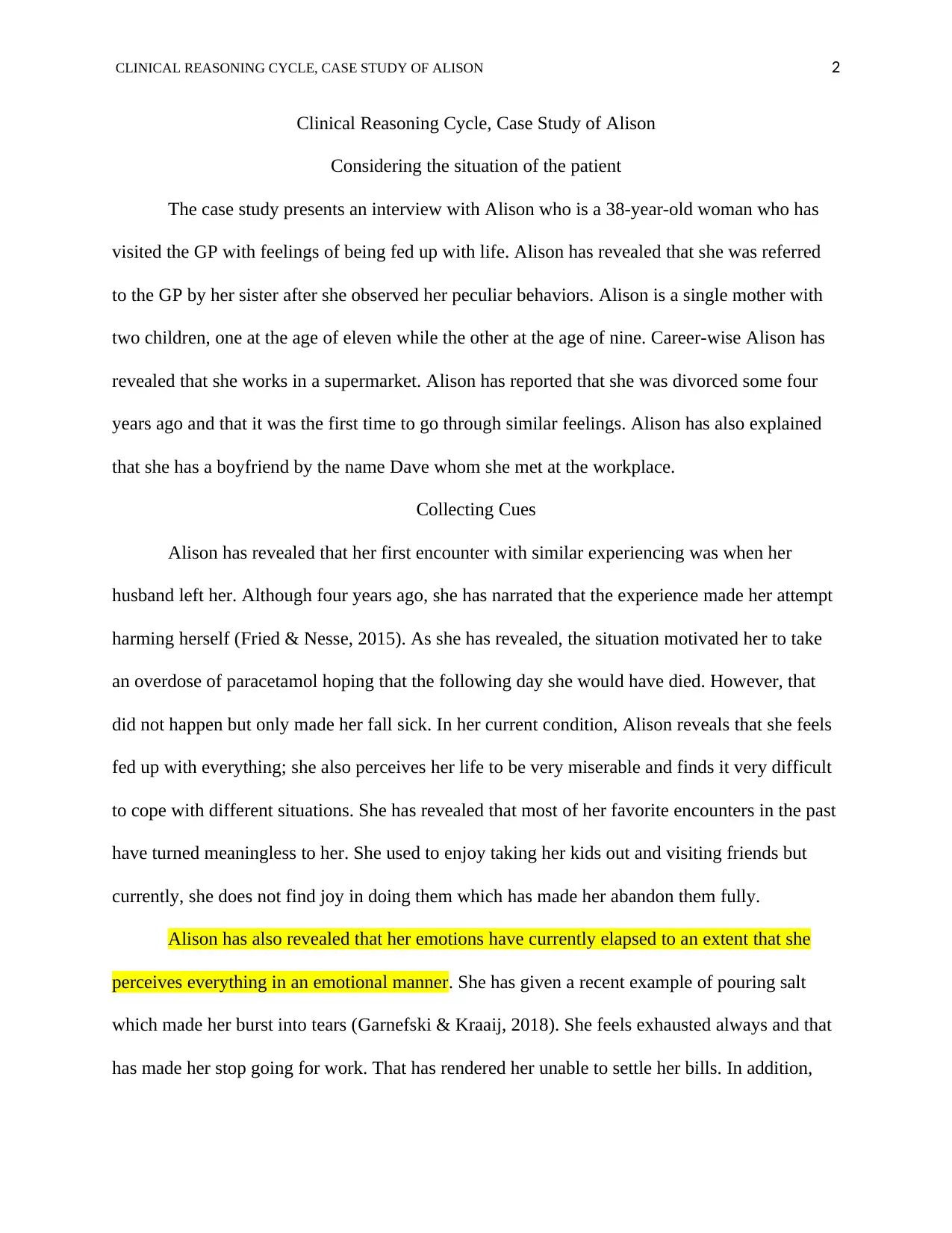
CLINICAL REASONING CYCLE, CASE STUDY OF ALISON 2
Clinical Reasoning Cycle, Case Study of Alison
Considering the situation of the patient
The case study presents an interview with Alison who is a 38-year-old woman who has
visited the GP with feelings of being fed up with life. Alison has revealed that she was referred
to the GP by her sister after she observed her peculiar behaviors. Alison is a single mother with
two children, one at the age of eleven while the other at the age of nine. Career-wise Alison has
revealed that she works in a supermarket. Alison has reported that she was divorced some four
years ago and that it was the first time to go through similar feelings. Alison has also explained
that she has a boyfriend by the name Dave whom she met at the workplace.
Collecting Cues
Alison has revealed that her first encounter with similar experiencing was when her
husband left her. Although four years ago, she has narrated that the experience made her attempt
harming herself (Fried & Nesse, 2015). As she has revealed, the situation motivated her to take
an overdose of paracetamol hoping that the following day she would have died. However, that
did not happen but only made her fall sick. In her current condition, Alison reveals that she feels
fed up with everything; she also perceives her life to be very miserable and finds it very difficult
to cope with different situations. She has revealed that most of her favorite encounters in the past
have turned meaningless to her. She used to enjoy taking her kids out and visiting friends but
currently, she does not find joy in doing them which has made her abandon them fully.
Alison has also revealed that her emotions have currently elapsed to an extent that she
perceives everything in an emotional manner. She has given a recent example of pouring salt
which made her burst into tears (Garnefski & Kraaij, 2018). She feels exhausted always and that
has made her stop going for work. That has rendered her unable to settle her bills. In addition,
Clinical Reasoning Cycle, Case Study of Alison
Considering the situation of the patient
The case study presents an interview with Alison who is a 38-year-old woman who has
visited the GP with feelings of being fed up with life. Alison has revealed that she was referred
to the GP by her sister after she observed her peculiar behaviors. Alison is a single mother with
two children, one at the age of eleven while the other at the age of nine. Career-wise Alison has
revealed that she works in a supermarket. Alison has reported that she was divorced some four
years ago and that it was the first time to go through similar feelings. Alison has also explained
that she has a boyfriend by the name Dave whom she met at the workplace.
Collecting Cues
Alison has revealed that her first encounter with similar experiencing was when her
husband left her. Although four years ago, she has narrated that the experience made her attempt
harming herself (Fried & Nesse, 2015). As she has revealed, the situation motivated her to take
an overdose of paracetamol hoping that the following day she would have died. However, that
did not happen but only made her fall sick. In her current condition, Alison reveals that she feels
fed up with everything; she also perceives her life to be very miserable and finds it very difficult
to cope with different situations. She has revealed that most of her favorite encounters in the past
have turned meaningless to her. She used to enjoy taking her kids out and visiting friends but
currently, she does not find joy in doing them which has made her abandon them fully.
Alison has also revealed that her emotions have currently elapsed to an extent that she
perceives everything in an emotional manner. She has given a recent example of pouring salt
which made her burst into tears (Garnefski & Kraaij, 2018). She feels exhausted always and that
has made her stop going for work. That has rendered her unable to settle her bills. In addition,
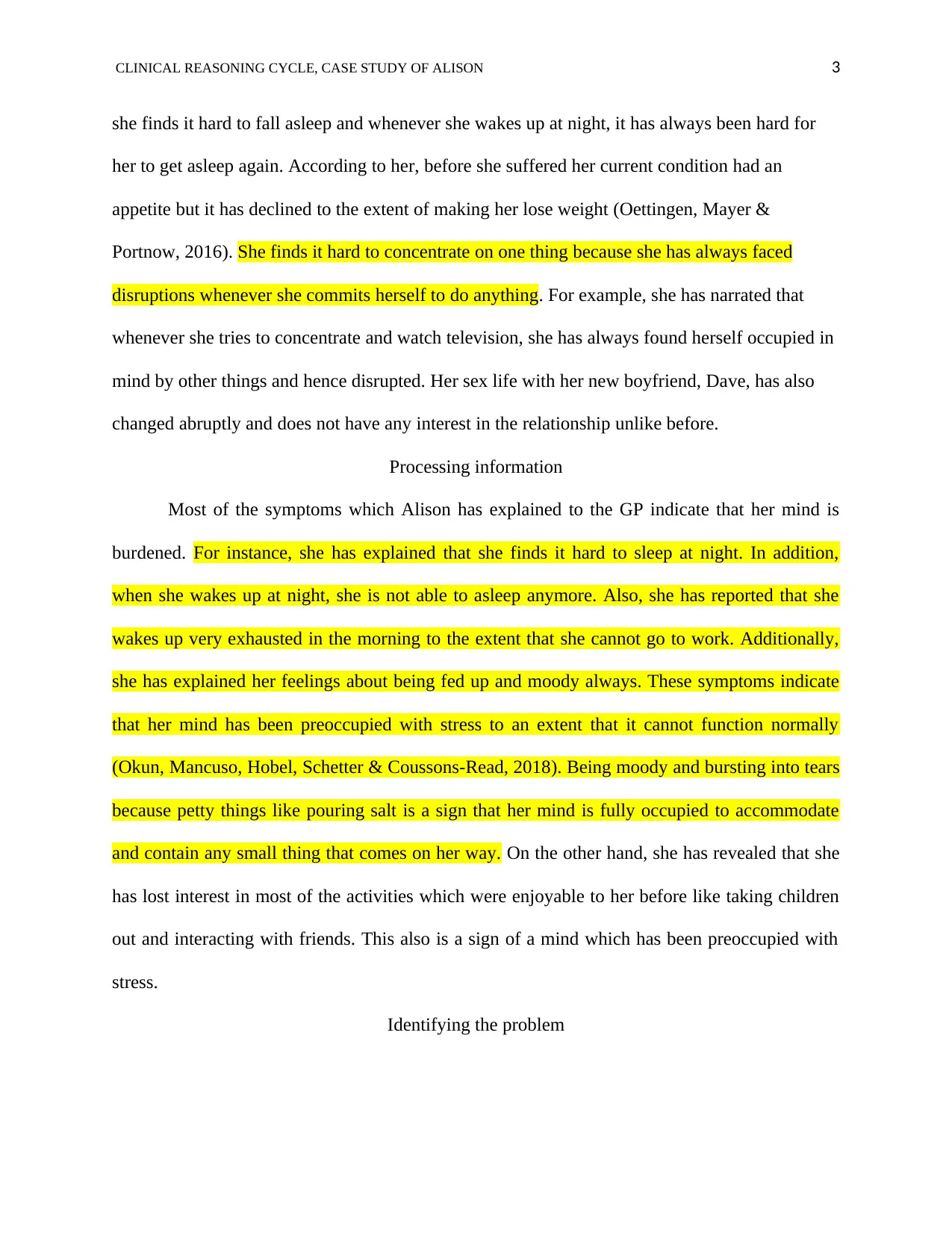
CLINICAL REASONING CYCLE, CASE STUDY OF ALISON 3
she finds it hard to fall asleep and whenever she wakes up at night, it has always been hard for
her to get asleep again. According to her, before she suffered her current condition had an
appetite but it has declined to the extent of making her lose weight (Oettingen, Mayer &
Portnow, 2016). She finds it hard to concentrate on one thing because she has always faced
disruptions whenever she commits herself to do anything. For example, she has narrated that
whenever she tries to concentrate and watch television, she has always found herself occupied in
mind by other things and hence disrupted. Her sex life with her new boyfriend, Dave, has also
changed abruptly and does not have any interest in the relationship unlike before.
Processing information
Most of the symptoms which Alison has explained to the GP indicate that her mind is
burdened. For instance, she has explained that she finds it hard to sleep at night. In addition,
when she wakes up at night, she is not able to asleep anymore. Also, she has reported that she
wakes up very exhausted in the morning to the extent that she cannot go to work. Additionally,
she has explained her feelings about being fed up and moody always. These symptoms indicate
that her mind has been preoccupied with stress to an extent that it cannot function normally
(Okun, Mancuso, Hobel, Schetter & Coussons-Read, 2018). Being moody and bursting into tears
because petty things like pouring salt is a sign that her mind is fully occupied to accommodate
and contain any small thing that comes on her way. On the other hand, she has revealed that she
has lost interest in most of the activities which were enjoyable to her before like taking children
out and interacting with friends. This also is a sign of a mind which has been preoccupied with
stress.
Identifying the problem
she finds it hard to fall asleep and whenever she wakes up at night, it has always been hard for
her to get asleep again. According to her, before she suffered her current condition had an
appetite but it has declined to the extent of making her lose weight (Oettingen, Mayer &
Portnow, 2016). She finds it hard to concentrate on one thing because she has always faced
disruptions whenever she commits herself to do anything. For example, she has narrated that
whenever she tries to concentrate and watch television, she has always found herself occupied in
mind by other things and hence disrupted. Her sex life with her new boyfriend, Dave, has also
changed abruptly and does not have any interest in the relationship unlike before.
Processing information
Most of the symptoms which Alison has explained to the GP indicate that her mind is
burdened. For instance, she has explained that she finds it hard to sleep at night. In addition,
when she wakes up at night, she is not able to asleep anymore. Also, she has reported that she
wakes up very exhausted in the morning to the extent that she cannot go to work. Additionally,
she has explained her feelings about being fed up and moody always. These symptoms indicate
that her mind has been preoccupied with stress to an extent that it cannot function normally
(Okun, Mancuso, Hobel, Schetter & Coussons-Read, 2018). Being moody and bursting into tears
because petty things like pouring salt is a sign that her mind is fully occupied to accommodate
and contain any small thing that comes on her way. On the other hand, she has revealed that she
has lost interest in most of the activities which were enjoyable to her before like taking children
out and interacting with friends. This also is a sign of a mind which has been preoccupied with
stress.
Identifying the problem
⊘ This is a preview!⊘
Do you want full access?
Subscribe today to unlock all pages.

Trusted by 1+ million students worldwide
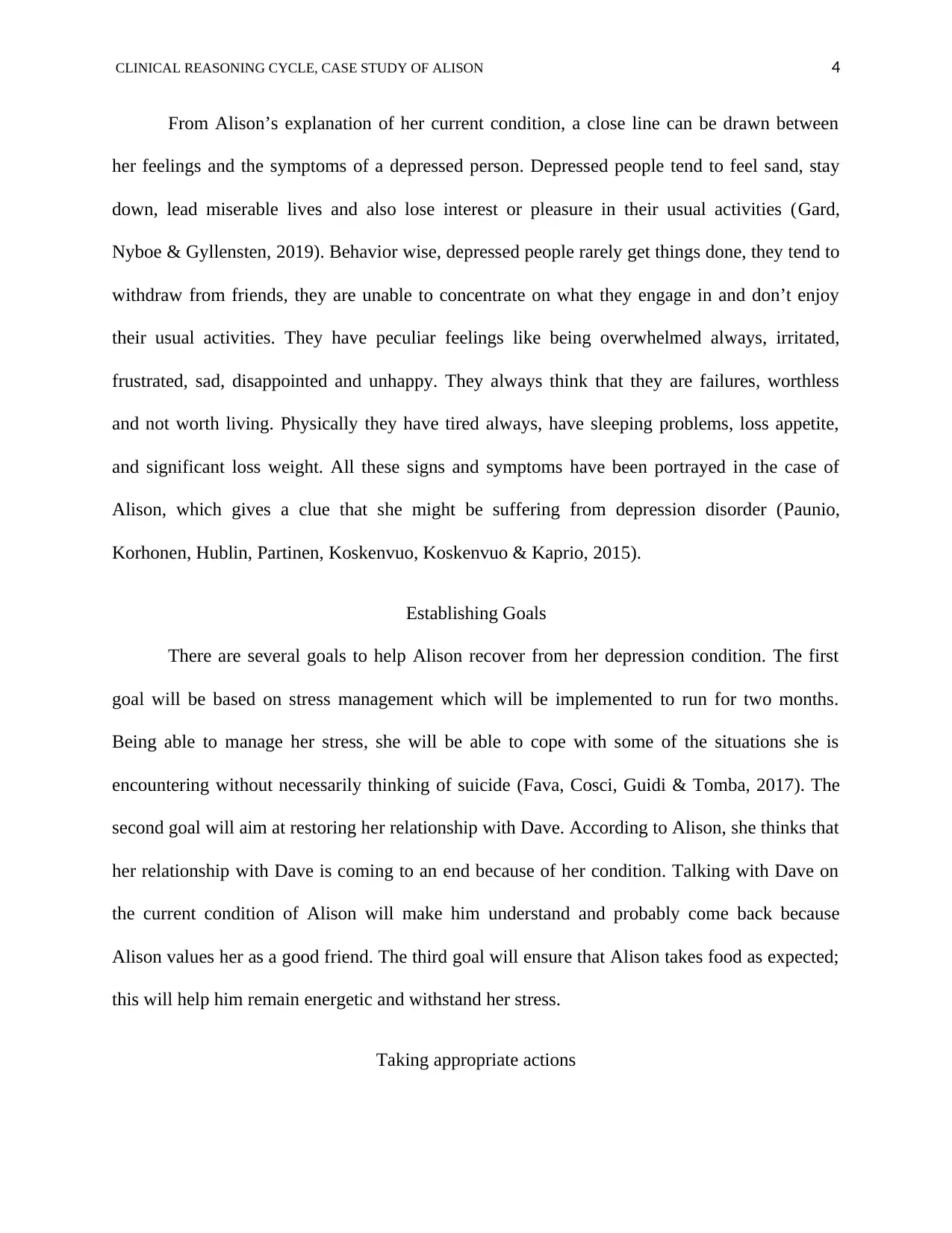
CLINICAL REASONING CYCLE, CASE STUDY OF ALISON 4
From Alison’s explanation of her current condition, a close line can be drawn between
her feelings and the symptoms of a depressed person. Depressed people tend to feel sand, stay
down, lead miserable lives and also lose interest or pleasure in their usual activities (Gard,
Nyboe & Gyllensten, 2019). Behavior wise, depressed people rarely get things done, they tend to
withdraw from friends, they are unable to concentrate on what they engage in and don’t enjoy
their usual activities. They have peculiar feelings like being overwhelmed always, irritated,
frustrated, sad, disappointed and unhappy. They always think that they are failures, worthless
and not worth living. Physically they have tired always, have sleeping problems, loss appetite,
and significant loss weight. All these signs and symptoms have been portrayed in the case of
Alison, which gives a clue that she might be suffering from depression disorder (Paunio,
Korhonen, Hublin, Partinen, Koskenvuo, Koskenvuo & Kaprio, 2015).
Establishing Goals
There are several goals to help Alison recover from her depression condition. The first
goal will be based on stress management which will be implemented to run for two months.
Being able to manage her stress, she will be able to cope with some of the situations she is
encountering without necessarily thinking of suicide (Fava, Cosci, Guidi & Tomba, 2017). The
second goal will aim at restoring her relationship with Dave. According to Alison, she thinks that
her relationship with Dave is coming to an end because of her condition. Talking with Dave on
the current condition of Alison will make him understand and probably come back because
Alison values her as a good friend. The third goal will ensure that Alison takes food as expected;
this will help him remain energetic and withstand her stress.
Taking appropriate actions
From Alison’s explanation of her current condition, a close line can be drawn between
her feelings and the symptoms of a depressed person. Depressed people tend to feel sand, stay
down, lead miserable lives and also lose interest or pleasure in their usual activities (Gard,
Nyboe & Gyllensten, 2019). Behavior wise, depressed people rarely get things done, they tend to
withdraw from friends, they are unable to concentrate on what they engage in and don’t enjoy
their usual activities. They have peculiar feelings like being overwhelmed always, irritated,
frustrated, sad, disappointed and unhappy. They always think that they are failures, worthless
and not worth living. Physically they have tired always, have sleeping problems, loss appetite,
and significant loss weight. All these signs and symptoms have been portrayed in the case of
Alison, which gives a clue that she might be suffering from depression disorder (Paunio,
Korhonen, Hublin, Partinen, Koskenvuo, Koskenvuo & Kaprio, 2015).
Establishing Goals
There are several goals to help Alison recover from her depression condition. The first
goal will be based on stress management which will be implemented to run for two months.
Being able to manage her stress, she will be able to cope with some of the situations she is
encountering without necessarily thinking of suicide (Fava, Cosci, Guidi & Tomba, 2017). The
second goal will aim at restoring her relationship with Dave. According to Alison, she thinks that
her relationship with Dave is coming to an end because of her condition. Talking with Dave on
the current condition of Alison will make him understand and probably come back because
Alison values her as a good friend. The third goal will ensure that Alison takes food as expected;
this will help him remain energetic and withstand her stress.
Taking appropriate actions
Paraphrase This Document
Need a fresh take? Get an instant paraphrase of this document with our AI Paraphraser
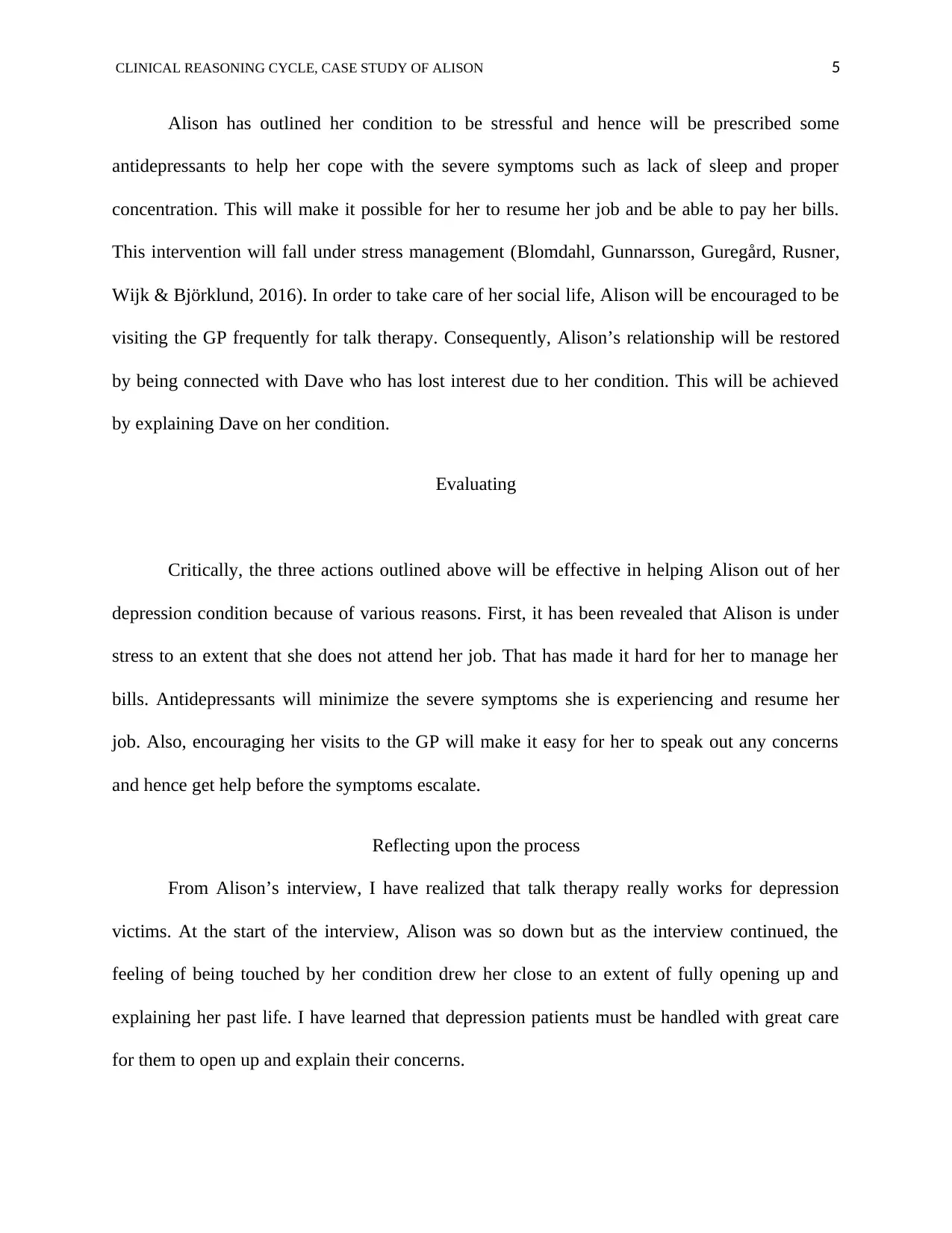
CLINICAL REASONING CYCLE, CASE STUDY OF ALISON 5
Alison has outlined her condition to be stressful and hence will be prescribed some
antidepressants to help her cope with the severe symptoms such as lack of sleep and proper
concentration. This will make it possible for her to resume her job and be able to pay her bills.
This intervention will fall under stress management (Blomdahl, Gunnarsson, Guregård, Rusner,
Wijk & Björklund, 2016). In order to take care of her social life, Alison will be encouraged to be
visiting the GP frequently for talk therapy. Consequently, Alison’s relationship will be restored
by being connected with Dave who has lost interest due to her condition. This will be achieved
by explaining Dave on her condition.
Evaluating
Critically, the three actions outlined above will be effective in helping Alison out of her
depression condition because of various reasons. First, it has been revealed that Alison is under
stress to an extent that she does not attend her job. That has made it hard for her to manage her
bills. Antidepressants will minimize the severe symptoms she is experiencing and resume her
job. Also, encouraging her visits to the GP will make it easy for her to speak out any concerns
and hence get help before the symptoms escalate.
Reflecting upon the process
From Alison’s interview, I have realized that talk therapy really works for depression
victims. At the start of the interview, Alison was so down but as the interview continued, the
feeling of being touched by her condition drew her close to an extent of fully opening up and
explaining her past life. I have learned that depression patients must be handled with great care
for them to open up and explain their concerns.
Alison has outlined her condition to be stressful and hence will be prescribed some
antidepressants to help her cope with the severe symptoms such as lack of sleep and proper
concentration. This will make it possible for her to resume her job and be able to pay her bills.
This intervention will fall under stress management (Blomdahl, Gunnarsson, Guregård, Rusner,
Wijk & Björklund, 2016). In order to take care of her social life, Alison will be encouraged to be
visiting the GP frequently for talk therapy. Consequently, Alison’s relationship will be restored
by being connected with Dave who has lost interest due to her condition. This will be achieved
by explaining Dave on her condition.
Evaluating
Critically, the three actions outlined above will be effective in helping Alison out of her
depression condition because of various reasons. First, it has been revealed that Alison is under
stress to an extent that she does not attend her job. That has made it hard for her to manage her
bills. Antidepressants will minimize the severe symptoms she is experiencing and resume her
job. Also, encouraging her visits to the GP will make it easy for her to speak out any concerns
and hence get help before the symptoms escalate.
Reflecting upon the process
From Alison’s interview, I have realized that talk therapy really works for depression
victims. At the start of the interview, Alison was so down but as the interview continued, the
feeling of being touched by her condition drew her close to an extent of fully opening up and
explaining her past life. I have learned that depression patients must be handled with great care
for them to open up and explain their concerns.
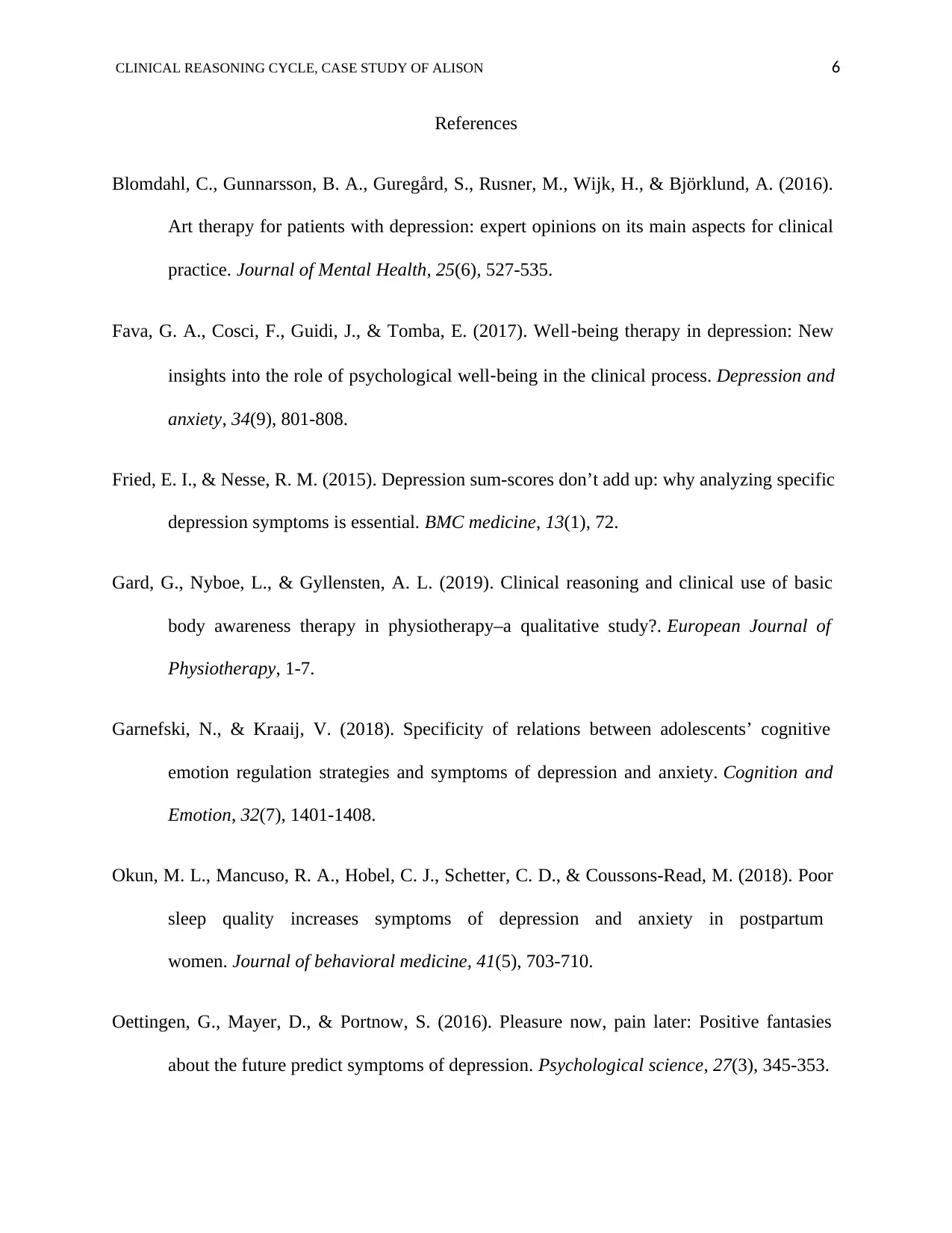
CLINICAL REASONING CYCLE, CASE STUDY OF ALISON 6
References
Blomdahl, C., Gunnarsson, B. A., Guregård, S., Rusner, M., Wijk, H., & Björklund, A. (2016).
Art therapy for patients with depression: expert opinions on its main aspects for clinical
practice. Journal of Mental Health, 25(6), 527-535.
Fava, G. A., Cosci, F., Guidi, J., & Tomba, E. (2017). Well‐being therapy in depression: New
insights into the role of psychological well‐being in the clinical process. Depression and
anxiety, 34(9), 801-808.
Fried, E. I., & Nesse, R. M. (2015). Depression sum-scores don’t add up: why analyzing specific
depression symptoms is essential. BMC medicine, 13(1), 72.
Gard, G., Nyboe, L., & Gyllensten, A. L. (2019). Clinical reasoning and clinical use of basic
body awareness therapy in physiotherapy–a qualitative study?. European Journal of
Physiotherapy, 1-7.
Garnefski, N., & Kraaij, V. (2018). Specificity of relations between adolescents’ cognitive
emotion regulation strategies and symptoms of depression and anxiety. Cognition and
Emotion, 32(7), 1401-1408.
Okun, M. L., Mancuso, R. A., Hobel, C. J., Schetter, C. D., & Coussons-Read, M. (2018). Poor
sleep quality increases symptoms of depression and anxiety in postpartum
women. Journal of behavioral medicine, 41(5), 703-710.
Oettingen, G., Mayer, D., & Portnow, S. (2016). Pleasure now, pain later: Positive fantasies
about the future predict symptoms of depression. Psychological science, 27(3), 345-353.
References
Blomdahl, C., Gunnarsson, B. A., Guregård, S., Rusner, M., Wijk, H., & Björklund, A. (2016).
Art therapy for patients with depression: expert opinions on its main aspects for clinical
practice. Journal of Mental Health, 25(6), 527-535.
Fava, G. A., Cosci, F., Guidi, J., & Tomba, E. (2017). Well‐being therapy in depression: New
insights into the role of psychological well‐being in the clinical process. Depression and
anxiety, 34(9), 801-808.
Fried, E. I., & Nesse, R. M. (2015). Depression sum-scores don’t add up: why analyzing specific
depression symptoms is essential. BMC medicine, 13(1), 72.
Gard, G., Nyboe, L., & Gyllensten, A. L. (2019). Clinical reasoning and clinical use of basic
body awareness therapy in physiotherapy–a qualitative study?. European Journal of
Physiotherapy, 1-7.
Garnefski, N., & Kraaij, V. (2018). Specificity of relations between adolescents’ cognitive
emotion regulation strategies and symptoms of depression and anxiety. Cognition and
Emotion, 32(7), 1401-1408.
Okun, M. L., Mancuso, R. A., Hobel, C. J., Schetter, C. D., & Coussons-Read, M. (2018). Poor
sleep quality increases symptoms of depression and anxiety in postpartum
women. Journal of behavioral medicine, 41(5), 703-710.
Oettingen, G., Mayer, D., & Portnow, S. (2016). Pleasure now, pain later: Positive fantasies
about the future predict symptoms of depression. Psychological science, 27(3), 345-353.
⊘ This is a preview!⊘
Do you want full access?
Subscribe today to unlock all pages.

Trusted by 1+ million students worldwide

CLINICAL REASONING CYCLE, CASE STUDY OF ALISON 7
Paunio, T., Korhonen, T., Hublin, C., Partinen, M., Koskenvuo, K., Koskenvuo, M., & Kaprio, J.
(2015). Poor sleep predicts symptoms of depression and disability retirement due to
depression. Journal of affective disorders, 172, 381-389.
Paunio, T., Korhonen, T., Hublin, C., Partinen, M., Koskenvuo, K., Koskenvuo, M., & Kaprio, J.
(2015). Poor sleep predicts symptoms of depression and disability retirement due to
depression. Journal of affective disorders, 172, 381-389.
1 out of 7
Related Documents
Your All-in-One AI-Powered Toolkit for Academic Success.
+13062052269
info@desklib.com
Available 24*7 on WhatsApp / Email
![[object Object]](/_next/static/media/star-bottom.7253800d.svg)
Unlock your academic potential
Copyright © 2020–2025 A2Z Services. All Rights Reserved. Developed and managed by ZUCOL.





